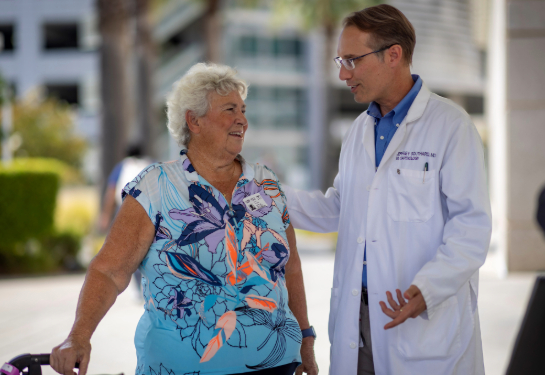Restrictive Cardiomyopathy (RCM)
Our specialists work together to create individualized approaches to cardiomyopathy care. You have access to innovative treatments to help you while still protecting your heart.
Medically reviewed by Michael Gibson, M.D. on May 25, 2023.

Expert Team Ready to Care for Your Heart
UC Davis Health Heart and Vascular Services has a team of expert cardiologists and cardiac surgeons. We do ongoing clinical research into diastolic heart failure, one of RCM’s more serious complications. We provide state-of-the-art treatment for RCM to give you the healthiest heart possible.
What Is Restrictive Cardiomyopathy?
RCM is a disease in which the heart's ventricles (lower chambers) become rigid and can’t fill with blood.
Abnormal tissue, like scar tissue, replaces the normal heart muscle. This replacement reduces blood flow in the heart over time. This condition can lead to arrhythmias or heart failure.
RCM is also known as idiopathic restrictive cardiomyopathy or infiltrative cardiomyopathy. Its symptoms are sometimes confused with those of constrictive pericarditis.
Although most people with RCM can live a normal life, the condition can be serious for some. It is associated with a higher risk of sudden death, even at a young age.
Restrictive Cardiomyopathy Symptoms
Even with the condition, many people don’t have symptoms of RCM. Symptoms develop slowly over time and most commonly resemble heart failure.
Common Symptoms
Common symptoms of RCM include:
- Breathing problems that occur at night, with activity or lying flat
- Chest pain
- Cough
- Fainting
- Fatigue and inability to exercise
- Lightheadedness
- Loss of appetite
- Swelling in the ankles, feet, legs or abdomen
- Uneven or rapid heart rate
Emergency Symptoms
Call 911 immediately if you experience heart attack symptoms, such as:
- Discomfort in the upper body, including both arms, the back, stomach, neck and jaw
- Chest pain
- Collapse and sudden cardiac arrest
- Nausea or vomiting
- Heart palpitations
- Shortness of breath
Restrictive Cardiomyopathy Causes
RCM is a rare disease that accounts for about 5% of all cardiomyopathy diagnoses. Certain diseases, conditions and factors can cause RCM, including:
Cancer Treatment
Some cancer treatments, such as radiation and chemotherapy, can lead to RCM due to tissue damage.
Heart Disease
Several heart diseases can cause issues that lead to RCM, including:
- Carcinoid heart disease (carcinoid tumor)
- Cardiac hemochromatosis (too much iron in the heart)
- Cardiac sarcoidosis (inflammation due to granulomas)
- Cardiac amyloidosis (amyloid protein buildup in the heart)
- Diseases of the endocardium
Scleroderma
Scleroderma is a condition that causes buildup of collagen (a hard, fibrous tissue) throughout the body. This hard scar tissue leads to poor blood flow and can cause RCM.
Restrictive Cardiomyopathy Risk Factors
RCM can affect individuals of any race, sex or age. Those most likely to have RCM often have certain underlying conditions.
Some of these conditions may be genetic or more common in certain populations. For example, sarcoidosis is most prevalent among Black women.
But risk factors for RCM tend to be acquired rather than genetic, including:
Age
As you age, your body and organs naturally undergo wear. Age can lead to changes in your heart that increase your chance for developing RCM.
Alcohol Misuse
Over time, excessive alcohol use can cause structural changes in your heart. These changes can damage its function and lead to problems, such as RCM.
Medication Exposure
Certain medications, including chemotherapy drugs, may damage your heart muscle as a side effect. Be sure to discuss any medication side effects with your doctor before taking it. Your body needs nutrients to carry out many important functions. When you have a poor diet, your body doesn’t get the support it needs to stay healthy and prevent damage over time.
Poor Diet
Your body needs nutrients to carry out many important functions. When you have a poor diet, your body doesn’t get the support it needs to stay healthy and prevent damage over time.
Diagnosing Restrictive Cardiomyopathy
Your physician will do a physical exam and ask questions about your medical history, family medical history and recent symptoms. A cardiologist, a physician who specializes in heart conditions, will diagnose and treat RCM.
Your physician may order one or multiple tests to confirm cardiomyopathy and any conditions related to the disease. These tests can include:
- Ambulatory monitors (Holter monitor) that record your heart’s activity over a period of time
- Blood and urine tests to check your iron and urine protein levels
- Cardiac catheterization, a procedure in which physicians place a tube (catheter) in your coronary arteries to understand how your heart is working
- Electrocardiogram (ECG or EKG) and Doppler study to detect your heart’s electrical activity and blood flow through your vessels
- Genetic testing can show if the disease runs in your family. It can reveal the chances of parents passing the genes for the disease to children.
- Stress tests determine if physical exertion triggers or worsens your RCM symptoms. They often involve a treadmill or stationary bike.
Your physician may also request imaging tests, such as:
- Chest CT Scan that uses X-rays to collect images of the heart and chest. It helps assess the size and function of your heart and heart valves.
- Chest X-ray takes pictures of your chest’s insides and shows if your heart is enlarged
- Coronary angiography, a procedure that injects dye into your coronary arteries. The dye can be seen on an x-ray, allowing your healthcare professional to study blood flow among your heart and blood vessels.
- Echocardiogram, a scan that uses sound waves to reveal how blood travels through your heart.
- Magnetic Resonance Imaging (MRI) that shows your physician detailed pictures of your heart. It also shows how well your heart’s chambers and valves are pumping blood.
- Nuclear heart scans (MUGA, RNV, PET) are used to show your cardiologist how the blood flows to your heart. It also shows how your heart pumps while under rest and stress.
Treatments for Restrictive Cardiomyopathy
RCM is difficult to treat. Your physician will work with you to treat the underlying cause of your condition.
The main goal of treatment is to improve your quality of life and control symptoms with the help of medications and lifestyle changes.
Medications
The following medications may be used to manage RCM symptoms:
- Blood thinning medicines
- Chemotherapy (in some situations)
- Diuretics
- Medicines to prevent abnormal heart rhythms
- Therapeutic phlebotomy (blood removal for hemochromatosis)
Lifestyle Changes
If a physician diagnoses you with RCM, heart-healthy choices can boost your health, such as:
- Limiting fluid and salt (sodium) intake
- Exercising with care (talk with your physician beforehand)
- Limiting or avoiding alcohol consumption
- Maintaining healthy weight
- Managing chronic conditions like diabetes or sleep apnea
- Quitting smoking or other tobacco use
"Restrictive Cardiomyopathy," NIH National Library of Medicine, https://www.ncbi.nlm.nih.gov/books/NBK537234/#:~:text=RCM%20is%20a%20fairly%20rare,is%20the%20least%20common%20form
Who does it affect?
5%Of all people diagnosed with cardiomyopathy have RCM
Source: StatPearls: Restrictive Cardiomyopathy
Request an Appointment
As Sacramento's No. 1 hospital, you'll benefit from unique advantages in primary care and specialty care. This includes prevention, diagnosis and treatment options from experts in 150 specialties.
Referring Physicians
To refer a patient, submit an electronic referral form or call.
800-4-UCDAVIS
Patients
Call to make an appointment.
Consumer Resource Center
800-2-UCDAVIS

Ranked among the nation’s best hospitals
A U.S. News & World Report best hospital in cardiology, heart & vascular surgery, diabetes & endocrinology, ENT, geriatrics, neurology & neurosurgery, and pulmonology & lung surgery.

Ranked among the nation’s best children’s hospitals
U.S. News & World Report ranked UC Davis Children’s Hospital among the best in pediatric nephrology, orthopedics*, and pulmonology & lung surgery. (*Together with Shriners Children’s Northern California)

Ranked Sacramento’s #1 hospital
Ranked Sacramento’s #1 hospital by U.S. News, and high-performing in aortic valve surgery, back surgery (spinal fusion), COPD, colon cancer surgery, diabetes, gynecological cancer surgery, heart arrhythmia, heart failure, kidney failure, leukemia, lymphoma & myeloma, lung cancer surgery, pacemaker implantation, pneumonia, prostate cancer surgery, stroke, TAVR, cancer, orthopedics, gastroenterology & GI surgery, and urology.

The nation’s highest nursing honor
UC Davis Medical Center has received Magnet® recognition, the nation’s highest honor for nursing excellence.

World-class cancer care
One of ~59 U.S. cancer centers designated “comprehensive” by the National Cancer Institute.

A leader in health care equality
For the 13th consecutive year, UC Davis Medical Center has been recognized as an LGBTQ+ Healthcare Equality Leader by the educational arm of America’s largest civil rights organization.

